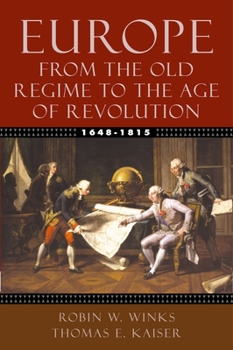Europe, 1648-1815: From the Old Regime to the Age of Revolution
Select Format
Select Condition 
Book Overview
In 1648, Europe was reeling from the destabilizing effects of religious conflict, economic change, and social upheaval. The issues that divided the Church in the late Middle Ages had forced Europeans to choose sides in a bitter and bloody Catholic/Protestant conflict. A powerful capitalist movement had broken down old social ties, leading to the near disappearance of serfdom in Western Europe and to the formation of a larger merchant class in the cities. The discoveries of the Scientific Revolution had begun to corrode old certainties about the universe, just as the exploration of the New World was revealing the existence of peoples, cultures, and even continents that would have been unimaginable to previous generations. In the face of such chaos, which led many to fear that society was heading towards an utter breakdown, the European elite engaged in a desperate effort to restore order. Between 1648 and 1750, peoples and governments throughout Europe sought to contain the shift toward anarchy through the reinforcement of religious orthodoxies, the strengthening of national states, and the stiffening of social hierarchies. But by the later eighteenth century, the success of this effort led paradoxically to new institutional and intellectual demands for change. The search for order had given way to a quest for progress. A new movement known as "the Enlightenment" was transforming the old order, and revolution was about to become a Western tradition.
Europe, 1648-1815 is a concise narrative of this fascinating epoch in European history. Framing the events of the period in terms of two successive movements--the search for order and the pursuit of reform--this book surveys the political, economic, social, and cultural events of the period, from the rise of absolutism to the campaigns of Napoleon, from the creation of European empires in the Americas to the controversies of the Enlightenment. With numerous selections from primary sources, a detailed and updated bibliography, a chronology of the period, and numerous illustrations, Europe, 1648-1815 is indispensable for courses on Early Modern Europe. It can be used as a stand-alone textbook or in conjunction with supplementary readings.
Europe, 1648-1815 is a concise narrative of this fascinating epoch in European history. Framing the events of the period in terms of two successive movements--the search for order and the pursuit of reform--this book surveys the political, economic, social, and cultural events of the period, from the rise of absolutism to the campaigns of Napoleon, from the creation of European empires in the Americas to the controversies of the Enlightenment. With numerous selections from primary sources, a detailed and updated bibliography, a chronology of the period, and numerous illustrations, Europe, 1648-1815 is indispensable for courses on Early Modern Europe. It can be used as a stand-alone textbook or in conjunction with supplementary readings.
Format:Paperback
Language:English
ISBN:0195154460
ISBN13:9780195154467
Release Date:July 2003
Publisher:Oxford University Press
Length:240 Pages
Weight:0.82 lbs.
Dimensions:0.5" x 6.8" x 9.2"
Customer Reviews
1 rating
Clear and concise introduction to this period of history.
Published by Thriftbooks.com User , 19 years ago
The late Professor Winks and Professor Kaiser have produced a gem of a book for the student historian. Europe, during the period covered by this book, saw a vast amount of change. England disposed of its royalty only to reinstate it, with Charles II, France became a republic, new lands/cultures were being discovered, the age of enlightenment was born and the industrial revolution occurred. Newton was discovering gravity, Voltaire was writing, Gainsborough painting and Haydn composing. The authors have covered all of these topics, and more, in a readable way that isn't weighted down with heavy prose. There are many illustrations scattered throughout which add to the enjoyment of this book. At a mere 199 pages it is not a text that covers any of these events in any great depth, but what it does do is to give a good introduction to them. Although concise it is not lacking relevant information. After reading this book, the student should have enough knowledge to discuss the important historiographical points from the era. The numerous references point the reader to other texts that will expand their knowledge should they need to. This is an excellent addition to the bookshelf.





